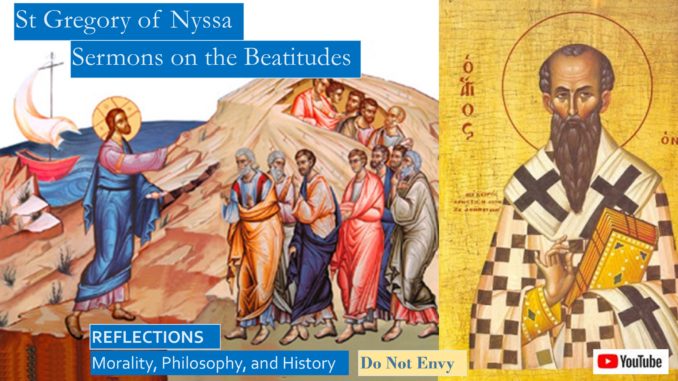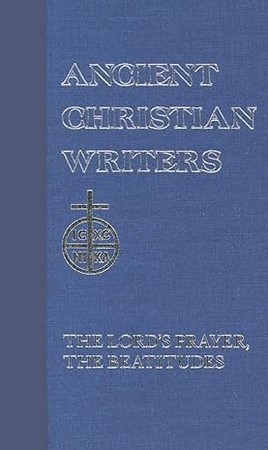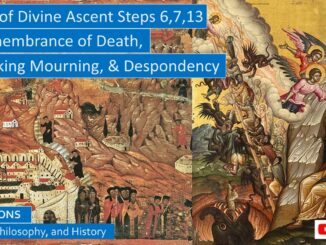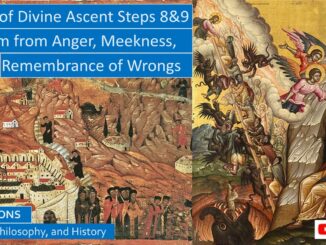
St Gregory of Nyssa compares the Beatitudes to the Holy of Holies in the ancient Temple of Yahweh. The Holy of Holies is a sacred space that is “of purer holiness than the sacred places around it,” the Beatitudes are a “gift surpassing hope, grace transcending nature.” Man is like grass, yet “he is received as a son of God of the universe.”
St Gregory of Nyssa, Beatitudes, Blog 4, Blessed are the clean of heart and the merciful
http://www.seekingvirtueandwisdom.com/st-gregory-of-nyssa-beatitudes-blog-4-blessed-are-those-who-do-not-envy/
YouTube video for Blogs 2 – 5: https://youtu.be/xaqFTPgoDI0
YouTube script for more book links: https://www.slideshare.net/BruceStrom1/st-gregory-of-nyssa-on-the-beatitudes-and-the-commandment-do-not-envy
BLESSED ARE THE PEACEMAKERS
St Gregory of Nyssa teaches that “if you are a peacemaker you be crowned by Christ with the grace of adoption as a son.” “Peace is sweet to enjoy and sweetens all that is held dear in life.” We all pray for a peaceful life, a good job with a fair boss, a loving spouse and family, happy vacations, precious memories, but good are these if they are cut short by the violence of war?
We must be one of the peacemakers. What is peace? Peace is a “loving disposition towards our neighbor.” What is the opposite of this love? The enemy of peace is “hate and wrath, anger and envy, harboring resentment as well as hypocrisy and the calamity of war.”
St Gregory of Nyssa explores how envy spoils peace for several pages of his sermon. He sees envy and anger and hypocrisy endangering the health of the soul, he values the peacemaker who cures souls over the doctor who heals the body. “The disease of envy and hypocrisy is cherished secretly in the depth of the heart, like a hidden fire,” while the hypocrite deceives by appearing to be a friend. He may hide his anger and envy from a sense of shame, but the fire buried under chaff still smolders, but if the person he envies “meets with some misfortune, then he reveals his disease, because he makes that man’s sorrow his own joy and pleasure.”
St Gregory of Nyssa reminds us that Cain fell prey to envy, “Cain raved when Abel was praised. The envy within commanded the murder, but hypocrisy became its executioner.” Cain pretended to be his caring brother, Cain lured his brother Abel out into the field, “and then he revealed his envy by murder.”
Scholars and preachers argue over the stories of Adam and Eve and the patriarchs in Genesis, the scholars arguing that these stories are mythologies that reveal the inner depths of our soul, the preachers arguing that these are true stories, that Adam and Eve and the patriarchs actually existed and the stories are real stores, not merely myths. But both camps miss the obvious significance of the stories in Genesis, that they teach us the Divine truths through the ordinary life experiences of ordinary people who often sin, who have to work through the consequences of their sin, but who are nevertheless blessed by God, though they suffer much. What the stories of Genesis should teach us is how we treat our family and friends and neighbors matters deeply.
St Gregory of Nyssa teaches us that the work God ordains for us is that we need “to cast out hated and abolish war, to exterminate envy and banish strife, to take away hypocrisy and extinguish the resentment from past injuries that is smoldering in our heart.” We need to break the cycle of hate and resentment. “For a light follows the departure of darkness, so the evils of envy and anger and resentment should be replaced by the fruits of the Spirit, by charity, joy, peace, kindness, and all the good things enumerated by the Apostle.”
We must make peace in our own heart before we can promote peace among others. The man who is foremost a peacemaker “pacifies perfectly the discord between flesh and spirit within himself.”[1]
BLESSED ARE THOSE WHO SUFFER PERSECUTION FOR JUSTICE’S SAKE
We conclude with the eighth Beatitude, which St Gregory of Nyssa likens to the mystery of the eighth day of Resurrection and to the ancient Jewish observance of purification and circumcision, which is also observed on the eighth day. “The purification indicates man’s return from defilement to his natural purity, circumcision means the casting off of the dead skins” that Adam had put on when his original sin brought death into the world. The eighth Beatitude recalls us from slavery to sin to eternal life in the Kingdom.
The Beatitudes promise the Kingdom of Heaven both to the poor in spirit and to those who suffer persecution for justice’ sake. St Gregory of Nyssa wonders why these virtues are not mentioned by Jesus when he separates the sheep from the goats on the Judgement of the Last Day:[2]
“All the nations will be gathered before him, and he will separate people one from another as a shepherd separates the sheep from the goats, and he will put the sheep at his right hand and the goats at the left. Then the king will say to those at his right hand, ‘Come, you that are blessed by my Father, inherit the kingdom prepared for you from the foundation of the world; for I was hungry and you gave me food, I was thirsty and you gave me something to drink, I was a stranger and you welcomed me, I was naked and you gave me clothing, I was sick and you took care of me, I was in prison and you visited me.’ Then the righteous will answer him, ‘Lord, when was it that we saw you hungry and gave you food, or thirsty and gave you something to drink? And when was it that we saw you a stranger and welcomed you, or naked and gave you clothing? And when was it that we saw you sick or in prison and visited you?’ And the king will answer them, ‘Truly I tell you, just as you did it to one of the least of these who are members of my family, you did it to me.’ “[3]
We are reminded by this passage that the Beatitudes in the Sermon on the Plain directly reminds us that not only are the poor in spirit blessed, but also the poor and down and out, and in case we do not comprehend, Jesus in Luke warns us, “woe to you who are rich, for you have received your consolation.”[4] So what is common between to these two Beatitudes and the words of Jesus on the Day of Judgement? St Gregory of Nyssa teaches us, “they all converge on the same goal,” they all show how the Love of God shines in our lives and in how we live our lives, and the love we show to our neighbor.
St Gregory of Nyssa reminds us of St Stephen, who was stoned to death as the first Christian martyr. “His body eagerly receives the showers of fast-falling stone like a pleasant dew, and repays his murders with blessings, praying that their sin not be imputed to them.” Why eagerly? St Maximus the Confessor also teaches us the true Christian should be eager in love to our neighbor, we should not merely forgive the wrongs and faults of our neighbor, we should be eager to forgive them.
St Gregory of Nyssa teaches us that this Beatitude, like all the Beatitudes, apply to us individually even if we do not live in a period of general persecution. He notes that “everyone knows how hard it is to bear if people, instead of loving us, scheme against us,” this is particularly true when those who scheme against us scheme against are family or close friends. We see this in the story of Joseph. “His brothers plotted against him and drove him from their company.” But after Joseph was sold into slavery he became the king of his brothers “who planned evil against him.” His brothers and father would have not been saved from the drought that gripped the Promised Land had they not sold him into slavery. “Their envy paved the way for their salvation by this evil plot.” Joseph told his brothers that through their treachery they meant him evil, but that God used it for good. If Joseph can forgive his brothers for the many years he spent as a slave and as a prisoner in a foreign land, so we can forgive our neighbors, and be kind to them even when they persecute us. Our persecutions and sufferings should make us stronger. We should not “be pained by the loss of earthly things but be gladdened by the gain of heavenly ones.” “When we are persecuted by the enemy we should turn to God, accepting our sufferings to destroy the power of pleasure within us.”
Blessed are those who are persecuted for righteousness sake. St Gregory of Nyssa adds, “blessed are those who are driven from all this hostile, from corruption, darkness, and sin, from injustice and covetousness, in short, from anything that is not virtuous, whether in words, deeds, or thoughts.”[5]
All blogs on St Gregory of Nyssa: http://www.seekingvirtueandwisdom.com/?s=nyssa
[1] St Gregory of Nyssa, “On Beatitudes,” Sermon 7, in The Lord’s Prayer, the Beatitudes, translated by Hilda C Graff, (New York: Paulist Press, 1954) pp. 154-165.
[2] St Gregory of Nyssa, “On Beatitudes,” Sermon 8, pp. 166-167.
[3] https://www.biblegateway.com/passage/?search=matthew+25%3A32-40&version=NRSVCE
[4] https://www.biblegateway.com/passage/?search=luke+6%3A20-26&version=NRSVCE
[5] St Gregory of Nyssa, “On Beatitudes,” Sermon 8, pp. 168-175.





1 Trackback / Pingback